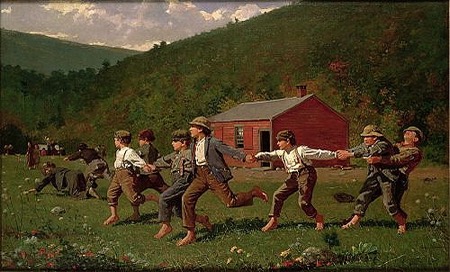MisConnected

Snap The Whip, Winslow Homer, 1872
"We can create vast networks dedicated to delivering on a fundamentally foolish notion and produce its opposite instead."
Our Internet was supposed to connect us all but seems to have achieved the opposite effect. The Greeks labeled this phenomena Enantiodromia, and considered it a natural result, that things tend to run counter to original intent. Obsession explains some of this. Over-focus easily blinds one to creeping counter influences, leaving an over-passionate pursuer vulnerable to normal stumbling blocks. Ideation, initial envisioning, tends toward idealization, so we quite naturally imagine utter impossibilities and produce opposites instead. Given free reign, we seem fully capable of running anything into the ground. Judicious constraining might seem to blunt possibility, but it also buffers against catastrophic reversals. Modesty seems more likely to produce positive results than audacity might.
The trades insist that everyone's ordering online now because it's more convenient. I live well behind this curve, having learned to avoid ordering online because of the great and growing inconvenience of it. Theoretically, it certainly seems like it might be easier to order a book from Amazon rather than trundle my butt down to one of the dwindling number of what's derisively called Brick and Mortar bookstores, but practice proves to be different than this theory. I don't order anything from Amazon because its so-called user interface doesn't work for me. It's clunky, likely to reject or lose me in transit, and reliable produces a deep sense of rejection for me. It's become the number one reminder that I must not belong in this world, since I cannot seem to reliably access what 'everyone' else can and does.
My backup disk seems to be failing. I'm going on twenty days without successfully completing a backup, a usually automatic, invisible, background process. Troubleshooting the difficulty involves accessing abstract and conflicting instructions, none of which actually address the problem, but subsume it instead. The proposed resolution becomes the replacement problem for the original, any likelihood of resolving the original issue erased by the utter impossibility of following the suggested resolution. It wants my ID, which I don't know. I can look it up, and it responds, though the ID it (it?) thinks of as me seems to have an out-dated PastWord, so it rejects the attempts of the me it believes is me to access the site. I cannot even schedule a physical appointment to have the hardware inspected by an actual tech unless we (we?) can agree on who I am. I apparently failed to backup my identity.
My email became unusable years ago, smothered by unwanted advertising I cannot seem to turn off. It daily accumulates dozens of come-ons. Occasionally, someone I know will email me a message of true significance, perhaps one requiring a speedy response, though paper 'snail mail' would prove faster. I might stumble upon the urgent request a month or more after it was sent, tucked in-between ten dozen irrelevant insistences. I feel connected to nothing and more DisConnected than I ever felt before our Internet connected us all together. Enantiodromia again.
I tried yesterday to sign up online for a week-long writer's conference I'd been hankering after attending for a decade. Finally, this year, it appeared that I might find the resources to attend. The on-line signup facility prevented me from consummating the deal. An hour into my attempt, I'd just about lost all interest in attending, the sign-up system having achieved Enantiodromia, too. The moral of this story seems to be one of those SmallThings I've been mumbling about these past few weeks. We were not born into a state of connectedness, but some state more like its opposite. We perhaps naively aspire to reverse this feature. We genuinely feel that our condition might improve if only we could undo the DisConnected-ness we feel. The harder we try to undo any natural order, the more, it seems, we frustrate ourselves. The difficulty might lie in the ideation, the cock-eyed notion that we really should be different from what we are, than we've always been. We can create vast networks dedicated to delivering on a fundamentally foolish notion and produce its opposite instead. The Ancient Greeks, who might have been less DisConnected than we've ever been, understood how such things could happen.
©2020 by David A. Schmaltz - all rights reserved


